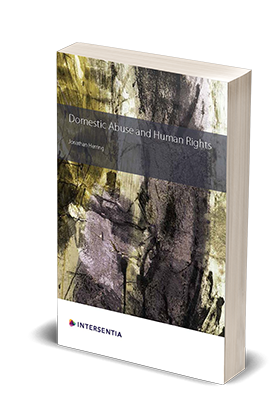| Interview |


Author speaking: Jonathan Herring about Domestic Abuse and Human Rights
JONATHAN HERRING is the DM Wolfe-Clarendon Fellow in Law at Exeter College and Professor of Law at the Faculty of Law, University of Oxford. He has written extensively on issues around family law, medical law and ethics, care law and criminal law.
Domestic abuse used to be seen as essentially a private matter. Now it is recognised as a major human rights issue. Which is the best definition of domestic abuse?
In the past domestic abuse was understood as an act of abuse: a punch or a kick. It is now better understood as being a relationship of coercion and control. Only by understanding the impact of the acts together as a means of controlling the other partner can we understand the true nature of domestic abuse. Domestic abuse also typically seeks to reinforce patriarchal attitudes about women: that they should dedicate themselves to meeting the needs of men; that they should not be involved in employment; and that their primary role is to produce and care for children. So domestic abuse is best understood as a relationship of coercive control within an intimate relationship which reinforces and reflects patriarchal oppression.
How is it related to human rights?
Human rights protect those interests which are fundamental to our well-being as people. Domestic abuse is an attack on a person’s identity. It is using a relationship which was of fundamental importance to them as a tool to attack them. It very often does so in a way which reflects and reinforces disadvantage against women, disabled people, minority racial and religious groups. It is, therefore, a profound human rights issue.
Who is affected by domestic abuse?
We know that both men and women can be victims of domestic abuse; and that it transcends socio-economic, cultural and religious boundaries. It is pervasive. But when we look at domestic abuse at the most serious level, when it involves coercive control, then it is highly gendered, nearly always involving male abuse of women.
You usually say that our relationships are what give meaning to our lives. What happens, from a legal perspective, when these relationships are used to tear people down?
That is one of the problems with the current law. It has a very particular understanding of what counts as an injury: an attack on the body of another. The importance of our relationship to our identity and well-being is not recognised. So an attack by a partner will be charged as assault causing actual bodily harm, just as it would be if it was done by a person in the street. In 2020 we saw the introduction of an offence of coercive control which begins to recognise the true nature of the wrong involved in domestic abuse.
Should states guarantee security at home?
In the past domestic abuse was seen as a private matter. Now we recognise that domestic abuse is a major human rights abuse. It causes major social harms and reinforces gender inequalities within society. So there are very good grounds for the state seeking to ensure protection from domestic abuse. I am not sure that the state can guarantee security at home as there are limits on the extent to which the state can do. However, there is an obligation on the state to take all reasonable steps to make relationships safe.
What should be the role of society?
Society has played a role in enabling and perpetuating domestic abuse. It therefore has a responsibility to respond effectively to it. The Istanbul Convention has some excellent suggestions for what society should do. It recognises that the response must be multi-layered. It involves schools, refuges, the police, courts, housing authorities and each and everyone of us to challenge the attitudes and beliefs that underpin domestic abuse and ensure there are effective resources for those escaping from it. As I put it in the book:
“Society has ignored domestic abuse for too long, but worse than that, it has enabled, perpetuated and nourished it. In domestic abuse, the patriarchal forces prevalent throughout society are laid open for all to see in a microcosm. Women must obey men. Women should be servants of men. Women are there for men’s enjoyment and to meet their needs. If women dare to depart from these roles, they will be punished and put back in their place. Patriarchy bears its ugliest face....”
About the book


Domestic Abuse and Human Rights
This book sets out a human rights approach to domestic abuse. It argues that the European Convention on Human Rights provides a powerful framework upon which to build a strong legal response to the problem of domestic abuse.
Jonathan Herring
October 2020
ISBN 9781780682310